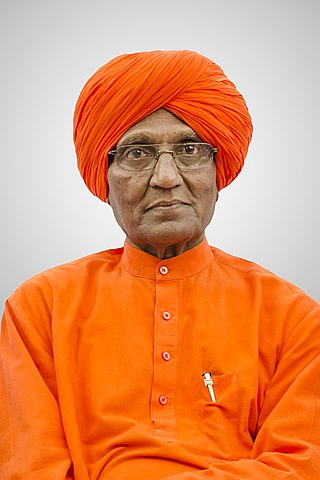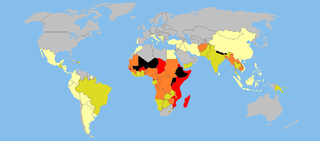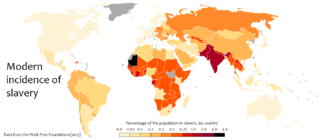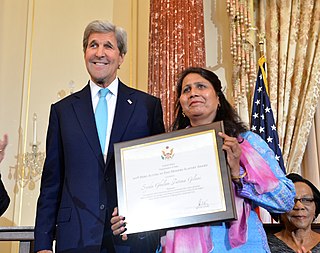
Debt bondage, also known as debt slavery, bonded labour, or peonage, is the pledge of a person's services as security for the repayment for a debt or other obligation. Where the terms of the repayment are not clearly or reasonably stated, or where the debt is excessively large the person who holds the debt has thus some control over the laborer, whose freedom depends on the undefined or excessive debt repayment. The services required to repay the debt may be undefined, and the services' duration may be undefined, thus allowing the person supposedly owed the debt to demand services indefinitely. Debt bondage can be passed on from generation to generation.

Iqbal Masih was a Pakistani Christian child labourer and activist who campaigned against abusive child labour in Pakistan.
Masih is Arabic for 'Christ' or 'Messiah'. Christians, Muslims and members of related religions use Masih as a religious title for Jesus of Nazareth.

GoodWeave International is a network of non-profit organizations dedicated to ending illegal child labour in the rug making industry. Founded in 1994 by children's rights activist and Nobel Peace Prize winner Kailash Satyarthi, it provides a certification program that allows companies that pass inspection to attach a logo certifying that their product is made without child labour. It is an example of a product-oriented multistakeholder governance group.

Bandhua Mukti Morcha (BMM) (Hindi: बंधुआ मुक्ति मोर्चा, or Bonded Labour Liberation Front is a non-governmental organisation in India working to end bonded labour. Based in New Delhi, it was founded in 1981 by Swami Agnivesh who continued as its chairman until his death in 2020.

Kailash Satyarthi is an Indian social reformer who campaigned against child labor in India and advocated the universal right to education. In 2014, he was the co-recipient of the Nobel Peace Prize, along with Malala Yousafzai, "for their struggle against the suppression of children and young people and for the right of all children to education." He is the founder of multiple social activist organizations, including Bachpan Bachao Andolan, Global March Against Child Labour, Global Campaign for Education, Kailash Satyarthi Children's Foundation, and Bal Ashram Trust.
Bachpan Bachao Andolan is an India-based children's rights movement. It was started in 1980 by Nobel Laureate Mr. Kailash Satyarthi. It campaigns against bonded labour, child labour and human trafficking, and promotes the right to education for all children. It has so far freed close to 100,000 children from servitude, including bonded labourers, and helped in their re-integration, rehabilitation and education.

Craig Kielburger is a Canadian human rights activist and social entrepreneur. He is the co-founder, with his brother Marc Kielburger, of the WE Charity, as well as We Day and the independent, social enterprise Me to We. On April 11, 2008, Kielburger was named a member of the Order of Canada.

A significant proportion of children in India are engaged in child labour. In 2011, the national census of India found that the total number of child labourers, aged [5–14], to be at 10.12 million, out of the total of 259.64 million children in that age group. The child labour problem is not unique to India; worldwide, about 217 million children work, many full-time.
Pakistan is a source, transit, and destination country for men, women, and children subjected to trafficking in persons, specifically forced labour and prostitution. The largest human trafficking problem is bonded labour, concentrated in the Sindh and Punjab provinces in agriculture and brick making, and to a lesser extent in mining and carpet-making. Estimates of bonded labour victims, including men, women, and children, vary widely, but are likely well over one million. In extreme scenarios, when labourers speak publicly against abuse, landowners have kidnapped labourers and their family members. U.S. State Department's Office to Monitor and Combat Trafficking in Persons placed the country in "Tier 2 Watchlist" in 2017.
Child labour in Pakistan is the employment of children to work in Pakistan, which causes them mental, physical, moral and social harm. Child labour takes away the education from children. The Human Rights Commission of Pakistan estimated that in the 1990s, 11 million children were working in the country, half of whom were under age ten. In 1996, the median age for a child entering the work force was seven, down from eight in 1994. It was estimated that one quarter of the country's work force was made up of children. Child labor stands out as a significant issue in Pakistan, primarily driven by poverty. The prevalence of poverty in the country has compelled children to engage in labor, as it has become necessary for their families to meet their desired household income level, enabling them to afford basic necessities like butter and bread.

Debt bondage in India or Bandhua Mazdoori was legally abolished in 1976 but remains prevalent due to weak enforcement by the government. Bonded labour is a system in which lenders force their borrowers to repay loans through labor. Additionally, these debts often take a large amount of time to pay off and are unreasonably high, propagating a cycle of generational inequality. This is due to the typically high interest rates on the loans given out by employers. Although debt bondage is considered to be a voluntary form of labor, people are forced into this system by social situations.

The 2014 Nobel Peace Prize was shared, in two equal parts, between Kailash Satyarthi and Malala Yousafzai "for their struggle against the suppression of children and young people and for the right of all children to education". Satyarthi is from India, the seventh person from his country to win a Nobel Prize and the second to win the Peace Prize after Mother Teresa, while Yousafzai is a Muslim from Pakistan, the second Nobel Prize winner from her country after Abdus Salam, the forty-seventh woman to win the Nobel Prize, and at the age of 17 years, the youngest winner of a Nobel Prize in any field.

Syeda Ghulam Fatima is a Pakistani human and labour rights activist, known for her work in ending bonded labour in brick kilns, and is General Secretary of Lahore-based Bonded Labour Liberation Front Pakistan (BLLF).

Zafarullah Khan is a Pakistani Politician, Barrister-at-Law and Writer/Author. He served as Special Assistant to the Prime Minister on Law/Federal Minister, Government of Pakistan (2016-2018); Special Assistant to the Prime Minister on Human Rights, Minister of State, Government of Pakistan (2014–15); Special Assistant to the Prime Minister on Economic Affairs/ Minister of State Government of Pakistan (2014–15); Special Assistant to the Prime Minister on Cabinet Division/ Minister of State Government of Pakistan (2014–15); Special Assistant to the Prime Minister on Parliamentary Affairs/Minister of State Government of Pakistan (2014); Secretary, Law, Justice and Human Rights, Government of Pakistan. He Joined District Management Group of Civil Service of Pakistan (1987); served in the provinces of Punjab and Sindh in various Administrative, judicial and local Government positions from 1989 to 1995 and from 1998 to 2002.

The Blood Bricks Campaign is an international campaign that focuses on fighting against the use of modern slavery in the Indian bricks kiln industry, while also exposing companies that use blood bricks in their supply chain. It was launched in 2014 by multiple, different organizations including Union Solidarity International (USi), Prayas, Action Aid Association, War on Want, and Thompsons Solicitors. This campaign's objectives include supporting unionizing efforts by workers, applying pressure to state and federal governments to enforce or amend laws, identifying companies that use bricks from bonded or forced labour, and bringing attention to the working conditions in the brick industry in India, as well as other parts of the world.

The Price of Free is a documentary about Nobel Prize winner Kailash Satyarthi. The film, formerly known as Kailash, premiered at the 2018 Sundance Film Festival and won the Sundance Grand Jury Prize and debuted on YouTube in November 2018. The Price of Free was nominated for an Emmy for Outstanding Social Issue Documentary at the 40th News and Documentary Emmy Awards.

Jhalki (transl. Glimpse) is a 2019 Indian Hindi-language drama film directed by Brahmanand S. Siingh, produced by Brahmanand S. Siingh and Annand Chavan (OMG), co-produced by Vinayak Gawande and Jayesh Parekh and co-directed by Tanvi Jain. The film featuring Boman Irani, Tannishtha Chatterjee, Divya Dutta and Sanjay Suri, follows a 9-year-old street girl Jhalki, setting out to find her 7-year-old brother against the backdrop of the child slavery trade. The trailer of the film was released at the Cannes Film Festival in May 2019.

Payal Jangid is an Indian children's rights activist. She campaigns against child marriage, child labor and for the right to education for girls.
Masih, also spelled Mesih or Maseeh, is a name of Arabic origin which means 'Messiah' or 'Christ'. The word Masīḥ is the Arabic form of the Hebrew title Māshīaḥ (מָשִׁיחַ) or the Greek title Khristós (Χριστός), meaning "anointed one". It is used as a name and title for Jesus in the Quran, and is also the common word used by Arab Christians for Christ.
















